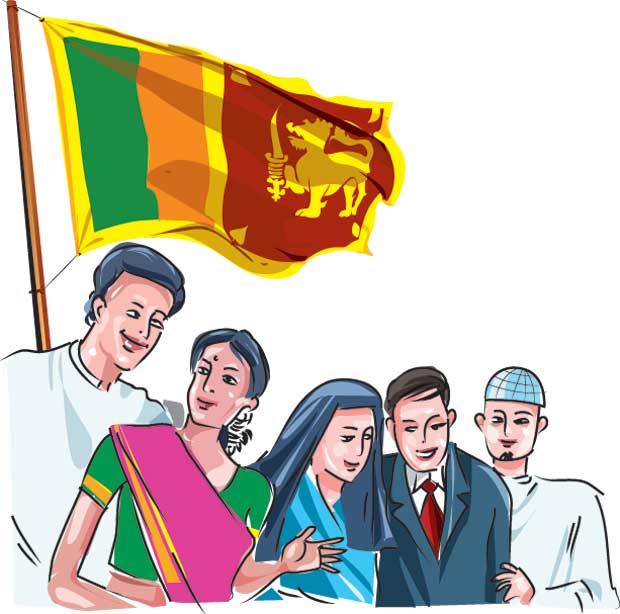21 Nov 2016 - {{hitsCtrl.values.hits}}

 n Friday, November 18, 2016 the Supreme Court (SC) of Sri Lanka upheld the right of the people of Sri Lanka to sing the national anthem of the country, Namo Namo Matha in one’s own mother-tongue.
n Friday, November 18, 2016 the Supreme Court (SC) of Sri Lanka upheld the right of the people of Sri Lanka to sing the national anthem of the country, Namo Namo Matha in one’s own mother-tongue.
What makes Namo Namo Matha unique is that it is a song of praise to the country alone. It does not glorify any race, caste, creed, community or religion. It is absolutely non-partisan and appeals to the patriotism of all the people of our country –Mother Lanka. It was because of this, that the Tamil people once the anthem was translated found nothing objectionable in the verses and took the anthem to heart and sang it with pride in their mother-tongue.
Looking back in time at past practices, the laws and the Constitution of the country, the Supreme Court, found no objection to the Namo Namo Matha, (Adopted on November 22, 1951 as the national anthem of this country), being sung in one’s mother-tongue. What the ruling means is that all citizens of Mother Lanka will be able to sing words and sentiments of praise, to this our country in a language they understand best and hold dear to their hearts. The ruling also emphasizes that irrespective of our differences, we are all equal and no one language, race or religion is held in higher esteem to the other.
In the end the national anthem of a country is a patriotic song, praising the history, traditions and struggles of its people and recognized by a nation’s government as the official national song of a country.
Until Ananda Samarakoon’s Namo Namo Matha was adopted as the national anthem in 1951, the then Ceylon had no national anthem!
The national anthem was translated into Tamil at the request of its first Prime Minister D.S. Senanayake. It was sung at the Independence Day celebrations on February 4, 1954 in the Tamil language in Jaffna, Vavuniya, Mannar, Trincomalee and Batticaloa. The practice has continued ever since, except for a brief period, when the Liberation Tigers of Tamil Eelam (LTTE) seized control of large swathes of the country during the ethnic conflict/war.
During this period singing or playing the Namo Namo Matha was discontinued in areas that came under the control of the LTTE. But even during those dark days, when the terror group controlled areas, which they referred to as their homeland, the LTTE did not have a substitute or separate Tamil Eelam anthem.
Gradually, as the military began regaining control of the north and east, the national anthem began to be played in the areas under military control. It was only once again on 4th February 2016 that the national anthem was sung in Tamil at Independence Day celebrations throughout the country. It should have been a day of rejoicing, as all sons and daughters of our country joined in to sing the praises of Mother Lanka in their mother-tongue with no coercion what-so-ever.
Unfortunately a few misguided ‘lion-hearted’ members of society opposed to the present governing party took up cudgels over the matter and attempted to gain cheap political mileage through opposing an action which in fact brought all Sri Lankans together and should have in fact been lauded. They went to the extent of taking out a Fundamental Rights Petition against the singing of the national anthem in Tamil.
Thus through its ruling, the Supreme Court has in no small measure helped recommence a process of healing, especially after the long-drawn ethnic war of 1983 - 2009, which polarized the different ethnicities making up the social fabric of the country. Lest we forget, for a number of years –from 1948 to 1951- Sri Lanka was a country without a national anthem.
Despite having gained independence in 1948, we were still singing God Save the Queen as our national anthem. In was only in August 1951, Sir E.A.P. Wijeratne presented a Cabinet Paper recommending Namo Namo Matha be recognized as the national anthem of the then Ceylon.
On November 22, 1951, the Cabinet unanimously adopted Namo Namo Matha as the National Anthem of the country
And it was only on February 4, 1952 that Namo Namo Matha was sung at Independence Day celebrations as the official national anthem of the country. On February 4th this year (2016) all people of the country joined hands to sing in unison and in tune mingled with different words but, which sang the same praise of this our emerald isle. November seems a significant month to Sri Lankans. In November 1951 Namo Namo Matha was adopted as the national anthem of this country and again it was in November, this time in 2016, the right of Sri Lankans to sing the national anthem in their mother-tongue was upheld by the Supreme Court of the land. Let’s hope, no man will try to put asunder what our national anthem seems to be bringing together.
25 Dec 2024 4 hours ago
25 Dec 2024 4 hours ago
25 Dec 2024 5 hours ago